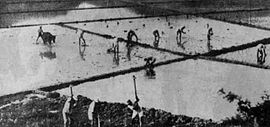- Nanniwan
-
Nanniwan (Chinese: 南泥湾; pinyin: Nánníwān; literally "South Muddy Bend") is a revolutionary song written in 1943 with lyrics by communist playwright and poet He Jingzhi (贺敬之) and music by Ma Ke. It was made popular by the Communist Party of China and continues to be one of the most recognisable songs in the People's Republic of China.
Nanniwan is a gorge about 90km southeast of Yan'an, Shaanxi province. In response to economic blockades by the Imperial Japanese Army and Kuomintang in 1941, the Communists set up an Opium production committee with Ren Bishi as its head and began experimenting with small scale agricultural development as well as poppy production in a bid to become self-sufficient. The 359th brigade of the Eighth Route Army was deployed to Nanniwan to improve productivity. In 1943 Nanniwan was heralded a success, and a propagandist song was commissioned. The lyrics, written by He Jingzhi, were set to a traditional folk melody of northern Shaanxi.
The song rose during the last years of the Second Sino-Japanese War and continued to be popular after the Communist victory in 1949. It is the signature song of the important revolutionary singer Wang Kun, and Cui Jian, widely regarded as the "father of Chinese rock," created a rock music version of the song in 1991. It experienced a revival during the mid-1990s along with other revolutionary songs.
Categories:- China stubs
- 1943 songs
- Political party songs
- Chinese patriotic songs
Wikimedia Foundation. 2010.

